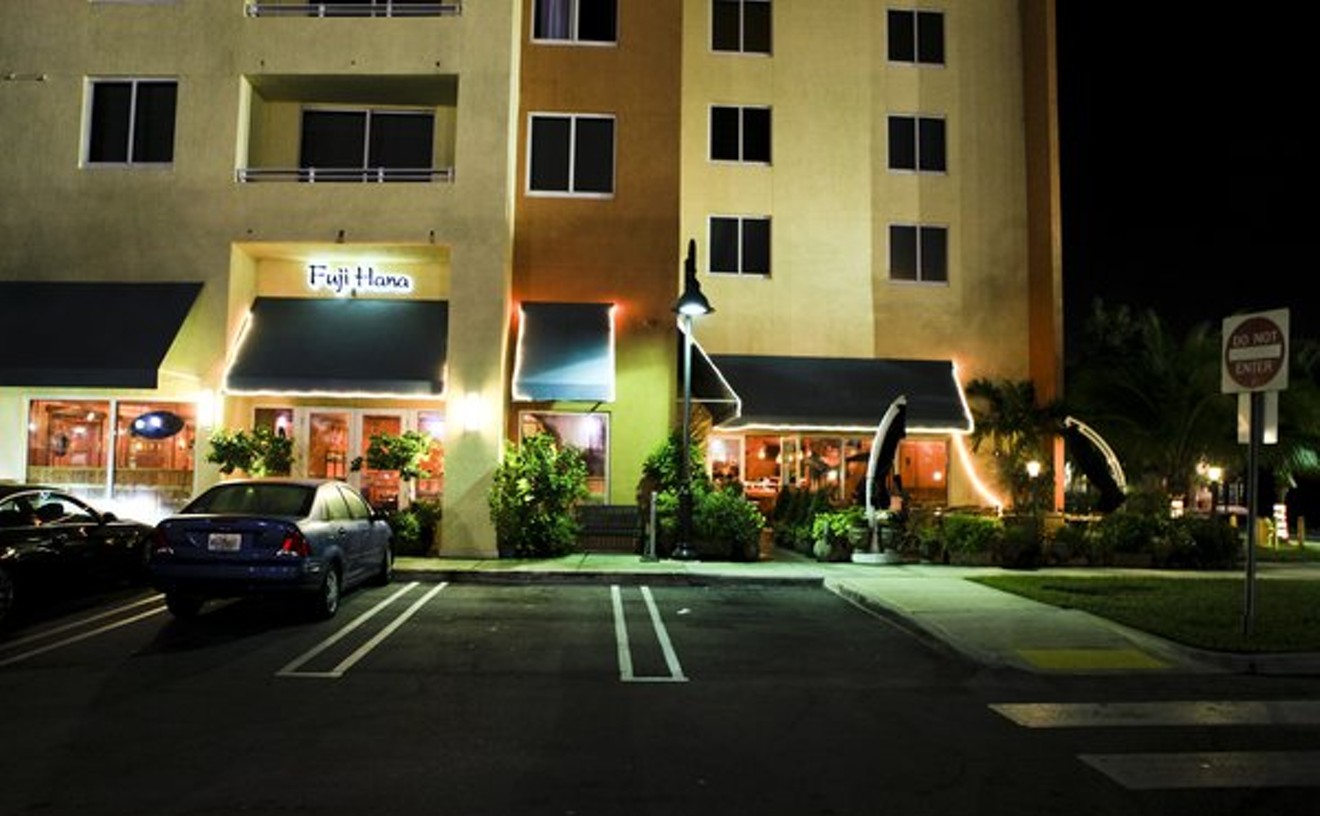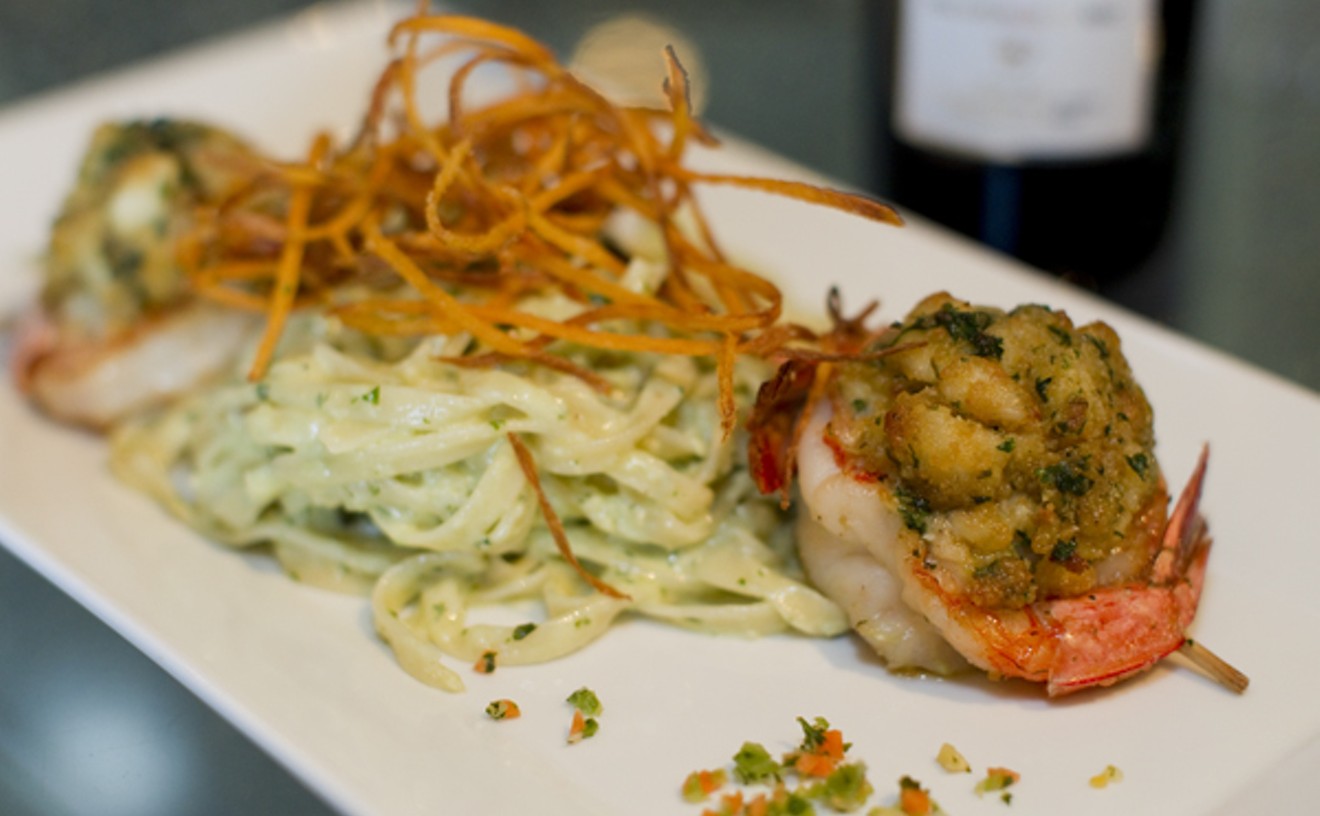Best Wine Bar
The Blue Piano Music Lounge & Wine Bar
Dear Blue Piano:To the naked eye, you look like any other modest neighborhood place: small with simple wood tables, some art on the walls, and a bar. Yet you're more than meets the eye. You're down-to-earth, and your staff has a way with guests, welcoming them into your cozy space and guiding them through your unique selection of wines. It's OK that you stay away from Cabernets and Chardonnays. Your selection of some 20 wines by the glass and 60 by the bottle aims to highlight other grapes like Sylvaner and Grüner Veltliner. A glass may be paired with one of your small bites. The boquerones with pickled shallots are most delicious. The cheese and charcuterie plates are good too. And you have that lovely piano, almost hidden from view in the back of the room, but played each evening by a local musician. All of this makes you special, Blue Piano. Cheers to that.
Best Juice Bar
Futuro Supermarket Cafeteria

We live in a city that regularly sees temperatures above 90 degrees. Fortunately, Miami's climate is also ripe for growing awesome produce of all kinds. That means there is no reason to settle for a made-from-concentrate, prepackaged juice box when you can have the real thing. Futuro Supermarket is like a blast from the past with its antiquated cash register and small aisles. But way at the back of the store sits the perfect oasis. Mango, pineapple, orange, carrot — the list of fresh juices goes on and on. They're served in a 16-ounce Styrofoam cup ($2) or sold by the half-gallon ($6). Either way, they taste like you just bit into the fruit itself.
- 13660 Miller Rd., West Dade, 33175 Map
- 305-382-6128
Best Sushi Happy Hour
Doraku
When your wallet is dwindling toward empty, the most luxurious spots start to feel like deserts full of shimmering, inviting oases that evaporate the second you try to parch your thirst. Take Lincoln Road: You can spend all day staring into hip restaurants packed with beautiful people scarfing sumptuous dinners, but if you have only 20 bucks to drop, you might as well be stranded in the Sahara. Until you stumble into Doraku. Happen into the sushi joint between 5 and 7 p.m. seven days a week, and even your meager cash will buy enough to stuff the hungriest Bedouin. Doraku, the brainchild of Kevin Aoki — son of legendary Benihana founder Rocky Aoki — already serves the best sushi in South Beach in one of the most chill settings, a sumptuously lit maze of birdcages and deeply recessed booths. So it's music to a broke diner's ears that Doraku also boasts the best sushi happy hour in the Magic City. Check it: Four bucks buys you a generously portioned crunchy crab or tuna avocado roll, and $3 brings a Doraku California. Wash everything down with $3 drafts of Kirin, Sapporo, or Shock Top and $4 specialty martinis, and before you know it, you're fed and tipsy for a crazy-cheap check. And don't worry: It's no mirage.
Best Sushi
Shibui Japanese Restaurant

You can afford to visit Shibui whenever the raw-fish fancy strikes. The family-owned restaurant, which opened in 1981 just north of Sunset Drive in Kendall, serves teriyaki, tempura, katsu, sukiyaki, and stir-fry dinners along with sushi (and some in tandem with it via combo plates). More than three dozen rolls are offered, many of which are now-familiar American fusions such as the volcano (salmon, cream cheese, avocado, and cucumber topped with cooked conch, mayo, and masago) and the dragon (shrimp tempura, crabmeat, mayo, and cucumber with avocado on top). They run $3.75 to $10.95; sushi dinners, served with soup, are $9.95 to $15.95. Sashimi (six to eight pieces) goes for $10.95; sashimi dinners (15 to 18 pieces), served with rice and soup, are $19.95 (or up to $25.95 for select fish such as hamachi). The fish is fresh, the service is friendly, and the prices are eminently affordable.
- 10138 SW 72nd St., Miami, 33173 Map
- 305-274-5578
- www.shibuimiami.com
Best Seafood on the Beach
Blue Door Fish
Blue Door at the Delano changed to Blue Door Fish this past year. The indoor portion of the restaurant, especially the lobby seating, is still defined by lofty white drapes. And the crowd is still trendy. Now, however, the executive chef is Sean Bernal, former top toque of the Oceanaire Seafood Room. And the focus is seafood-centric, the regional influence is more Mediterranean and less French/Brazilian, and the cuisine is better than ever. Diners can start with pristine raw bar selections such as Kumamoto oysters ($3 each) or jumbo shrimp ($4 per). Some eight types of fish or shellfish are offered simply grilled with choice of sauce, or plated with creative, preset accompaniments. Whether it be fresh local grouper gently caressed with lemon preserve and olive oil ($35), Alaskan wild salmon with classic French white wine/sorrel sauce, or Dover sole filleted tableside and served with almond brown butter and truffled potato foam ($66), the fish here gets dressed in style and consistently exhibits good taste.
Best Seafood on the Miami River
Casablanca Seafood Bar & Grill

Devin Peppler
Living in a coastal town such as Miami, where shores line a large portion of the topography, you expect good seafood to be readily available. But there's good, and then there's great. For the latter, look no further than Casablanca. When a place boasts its own market, fishermen in its employ, and more than 20 years in the biz, you can bet it serves the freshest seafood. And Casablanca's chefs know just what to do with the bounty delivered daily to their dock. Finding that fine balance between flair and finesse, they offer delicious preparations that respect the seafood as the star of the show. Try the crab-stuffed shrimp in garlic sauce ($23.95), which highlights the crustaceans' natural sweetness, or the famous zarzuela de mariscos ($28.95), with generous portions of shrimp, mussels, scallops, and lobster in a delicate tomato broth with a cognac flambé. Let's not forget the unbeatable weekday specials, such as all-you-can-eat free shrimp on Mondays and oysters on Wednesdays — which means you can munch for the sole price of libations. Then there are buy-one-get-one-free deals on the catch of the day Tuesdays, lobster Thursdays, and stone crab Fridays. Plus the market always has a variety of fresh fare, from snapper to grouper to claws of all sizes. And the prices: some of the most competitive in town.
- 404 NW North River Dr., Miami, 33128 Map
- 305-371-4107
- www.casablancaseafood.com
Best Restaurant in South Beach
Pubbelly

Photo by billwisserphoto.com
— I'm not sure I like the name Pubbelly. What's that supposed to mean?
— Ya see, it's like a pub: a bar serving loads of craft beers, boutique wines, and sakes. A bit dark, a hangout for locals.
— And the belly?
— Mostly of the pig, and all for the human.
— Huh?
— Pork belly. In a McBelly sandwich with kimchi ($6). On a plate bathed in butterscotch ($15). In dumplings with onion marmalade ($9). In a bowl of lemongrass broth with ramen noodles and poached egg ($16). With pineapple in fried rice ($17). Plus they serve imported hams and plenty of nonpork small-plate menu items as well. All plated for the lucky locals who arrive early enough to nab one of the seats in the cozy, brick-walled dining room.
— I think Brewbelly has a nicer ring. Or maybe Beerbelly!
— Look, we can spend hours coming up with clever names for this groovy gastropub. What say we do so over some cold beers at whatever you want to call it?
— Pig & Brew, here we come!
- 1418 20th St., Miami Beach, 33139 Map
- 305-532-7555
- www.pubbelly.com
Best Restaurant in the Design District/Midtown
Sustain Restaurant + Bar

Photo by billwisserphoto.com
"Our menus change with the seasons. It is our mission to provide customers with the purest and finest local ingredients and to support farmers who take great pride and passion in their work." Yeah, yeah, right. Heard that one before — like every single time a restaurant opens these days. But the owners of Sustain, which began operating this past year alongside Mercadito and Sugarcane Raw Bar Grill on a suddenly hot stretch of midtown, are actually keeping their word. Most emblematic of Sustain's honest approach to American cooking is the signature "50 mile salad," composed of seasonal products such as Borek Farms beets roasted in a wood-burning oven, Teena's Pride heirloom tomatoes, pickled onions, spicy brassica greens from Paradise Farms, and fromage blanc from Hani's Farm ($9 small/$16 large). The named farms are in or near Homestead, and every ingredient in the medley is plucked from within a 50-mile range. The rest of the menu likewise pays homage to sustainable foods, which would amount to squat if the stuff didn't taste outrageously good. But here it does.
- 3252 NE 1st Ave., Miami, 33137 Map
- 305-424-9079
- www.sustainmiami.com
Best Liquor Store
M&M Package Discount Liquors

At the intersection of LeJeune Road and SE Eighth Street a week before the March 15 recall election, Robert Gewanter's storefront sign captured the electorate's mood concerning a certain county commissioner facing imminent ouster: "Sweep Natacha Seijas out of office with the same broom she flew in on." For the past 18 years, Gewanter has been Miami-Dade's de facto town crier, issuing biting decrees about county politics and current events via laminated bold, black block letters. It began as a marketing gimmick to grab the attention of passing motorists. "The liquor business is very competitive," Gewanter explains. "It would be hard to put competitive prices up there, but people see a funny comment and remember the store." No one has been safe from Gewanter's sarcastic signage. Some of his regular foils have included former Hialeah Mayor Raul Martinez and President George W. Bush. Following Dubya's controversial victory in 2000, Gewanter declared, "He trusts people, what mumbo jumbo. If morons flew, the GOP logo would be Dumbo."
- 794 SE 8th St., Hialeah, 33010 Map
- 305-888-5551





